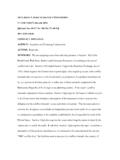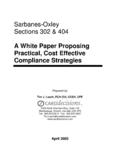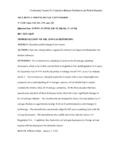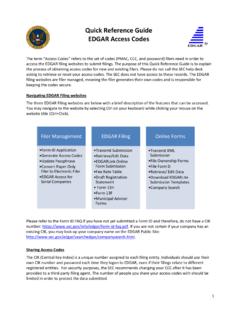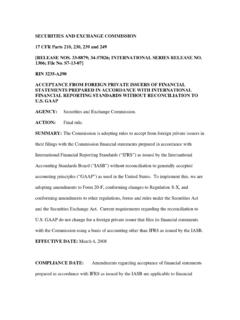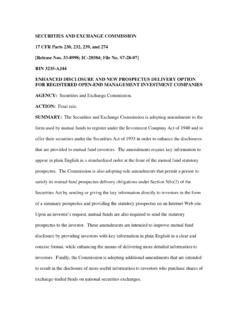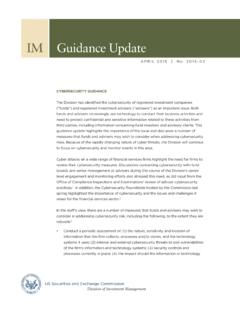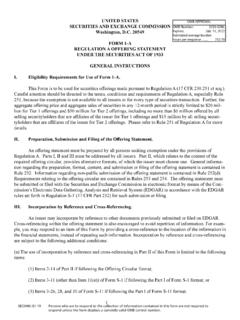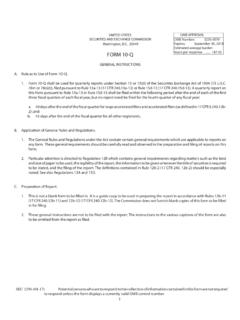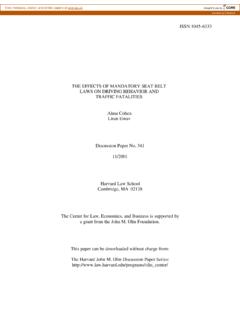Transcription of Shareholder Access to the Ballot - SEC.gov
1 issn 1045- 6333 harvard JOHN M. OLIN CENTER FOR LAW, ECONOMICS, AND BUSINESS THE CASE FOR Shareholder Access TO THE Ballot Lucian Arye Bebchuk Discussion Paper No. 428 8/2003, Revised 11/2003 As published in 59 The Business Lawyer 43-66 (2003) harvard Law School Cambridge, MA 02138 The Center for Law, Economics, and Business is supported by a grant from the John M. Olin Foundation. This paper can be downloaded without charge from: The harvard John M. Olin Discussion Paper Series: The Social Science Research Network Electronic Paper Collection: =426951 This paper is also a discussion paper of the John M. Olin Center's Program on Corporate Governance.
2 The Case for Shareholder Access to the Ballot Lucian Arye Bebchuk* Abstract The SEC is now considering a proposal to require some public companies to include in their proxy materials candidates for the board nominated by shareholders . I document that incumbents do not currently face any meaningful risk of being replaced via the Ballot box, and I argue that providing Shareholder Access would be a moderate step toward improving board accountability. Analyzing each of the objections that opponents have raised against the proposed Shareholder Access , I conclude that none of them provides a good basis for opposing it.
3 Indeed, it would be desirable to supplement Shareholder Access with additional measures to invigorate corporate elections. Key words: corporate governance, directors, shareholders , Shareholder voting, corporate elections, proxy fights, proxy contests, proxy rules, SEC. JEL classification: D70, G30, G32, G34, G38, K22. Lucian Bebchuk 2003. All rights reserved. * William J. Friedman and Alicia Townsend Friedman Professor of Law, Economics, and Finance, harvard Law School; Research Associate, National Bureau of Economic Research. This paper builds on the comment letter that I sent to the SEC on the subject of possible changes in the proxy rules ( ).
4 I am grateful to Bob Clark, Marcel Kahan, Bob Pozen, BJ Trach, and members of the harvard corporate governance group for helpful discussions and suggestions. I also wish to thank Fred Pollock, Rob Maynes, and Wei Yu for their research assistance, and the John M. Olin Center for Law, Economics, and Business for its financial support. The paper was largely finalized before the SEC s recent adoption of a formal rule proposal. In writing it, I therefore focused on analyzing the basic pros and cons of the Shareholder Access regime considered in the Commission s initial release and in the subsequent report of the SEC staff.
5 I added in footnotes commenting on the concretization in the formal rule proposal of the triggering event idea generally put forward in the staff report. The Securities and Exchange Commission (SEC) last spring began a process of considering changes in the proxy rules that would require companies, under certain circumstances, to include in their proxy materials Shareholder -nominated candidates for the board. Following an initial round of public comments, the SEC s Division of Corporation Finance recommended that the Commission propose for public comment rules that would provide such Shareholder Although most of the comments received thus far by the SEC have been in favor of reform, The Business Roundtable, other business associations, and prominent corporate law firms and bar groups, have all expressed opposition to Shareholder In their article in this issue of The Business Lawyer.
6 Martin Lipton and Steven Rosenblum put forward a forceful statement of the main concerns and objections expressed by opponents of Shareholder This paper seeks to put forward the case for Shareholder Access and to address the wide range of objections raised its opponents. I begin by discussing why corporate elections need invigoration and how providing Shareholder Access would be a moderate step toward this goal. The main part of this Article then examines in detail each of the objections that opponents of Shareholder Access have put forward. I conclude that they do not provide a good basis for opposing Shareholder Access .
7 I also point out that the available empirical evidence is supportive of such reform. After concluding that the case for Shareholder Access is strong, I suggest that it would be desirable and important to adopt additional measures to make shareholders power to replace directors meaningful. 1 SEC STAFF REPORT: REVIEW OF THE PROXY PROCESS REGARDING THE NOMINATION AND ELECTION OF DIRECTORS 32 33 (July 15, 2003), at [hereinafter STAFF REPORT]. 2 All letter comments are available at (last visited October 9, 2003).
8 Law firms and lawyer groups writing in opposition of Shareholder Access include the Association of the Bar of the City of New York ( NYC Bar ), the New York State Bar Association ( NY Bar ), the American Corporate Counsel Association (ACCA), Sullivan & Cromwell, and Wachtell, Lipton, Rosen, and Katz ( Wachtell, Lipton ). A comment letter that provided a detailed analysis of the different options, but refrained from taking a position, was submitted by the Task Force on Shareholder Proposal, American Bar Association (ABA) Section of Business Law. See Letter from David M. Silk, Chairman, Task Force on Potential Changes to the Proxy Rules, The Association of the Bar of the City of New York, to SEC (June 13, 2002), at [hereinafter NYC Bar].
9 3 See Martin Lipton & Steven A. Rosenblum, Election Contests in the Company's Proxy: An Idea Whose Time Has Not Come, 59 BUS. LAW. ____ (2003). I. THE NEED FOR INVIGORATING CORPORATE ELECTIONS The recent corporate governance crisis highlighted the importance of good board performance. Reforming corporate elections would improve the selection of directors and the incentives they face. Some supporters of Shareholder Access have Shareholder voice and corporate democracy as objectives. But the case for Shareholder Access does not depend on having such. My analysis below will focus on the sole objective of effective corporate governance that enhances corporate value.
10 From this perspective, increased Shareholder power or participation would be desirable if and only if such a change would improve corporate performance and The identities and incentives of directors are extremely important because the corporate law system leaves, and must leave, a great deal of discretion in their hands. Directors make or approve important decisions, and courts defer to these decisions. Among other things, directors have the power to block high-premium acquisition offers, as well as to set the compensation (and thus shape the incentives) of the firm s top executives. How can we ensure that directors use their power well?

